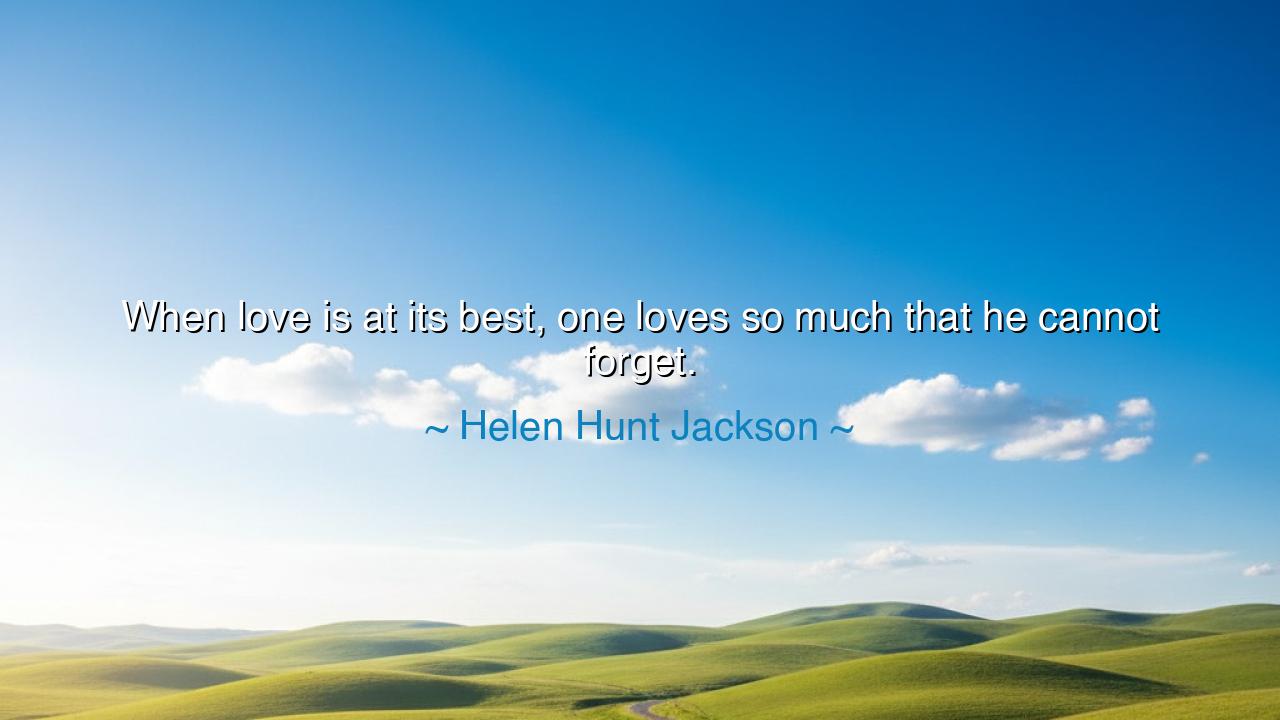
When love is at its best, one loves so much that he cannot






When Helen Hunt Jackson wrote, “When love is at its best, one loves so much that he cannot forget,” she spoke not of fleeting passion, but of enduring devotion—a love that becomes inseparable from memory itself. Jackson, a 19th-century poet and novelist, understood the depth of the human heart. Her life was marked by great compassion, deep empathy, and profound loss, and through these experiences she learned that true love leaves a permanent mark upon the soul. To love at its best is to love in such a way that forgetting becomes impossible—not because of obsession, but because love has become part of one’s very being.
The origin of this quote can be traced to Jackson’s lifelong reflection on love and loss. She endured personal grief, losing both her husband and children, yet her writing overflowed with tenderness rather than despair. Through her pain, she came to see that love’s greatest proof lies not in its constancy during happiness, but in its endurance through absence. The one who truly loves does not cease to love when the beloved is gone; the memory becomes sacred, a kind of quiet eternity within the heart. In this sense, love is not erased by time—it is preserved by remembrance.
When Jackson says that love “cannot forget,” she reminds us that memory is not a burden but a blessing. To remember someone with love is to keep them alive within the spirit. Ancient poets and prophets have spoken the same truth: the Greeks believed that memory, Mnemosyne, was the mother of all the Muses, the source of creativity and meaning. So too does love give birth to beauty through remembrance. When love reaches its highest form, it transforms pain into poetry, loss into wisdom, and longing into gratitude. The lover who remembers does not dwell in sorrow, but in reverence—for even absence becomes a form of presence.
History bears witness to the truth of her words. Consider Dante Alighieri, who, after the death of his beloved Beatrice, wrote The Divine Comedy as both an act of devotion and spiritual transcendence. He could not forget her, nor did he wish to. Through memory, his love became eternal, guiding him through darkness toward divine light. Or think of Queen Victoria, who mourned her husband, Prince Albert, for four decades, keeping his memory alive in every act of her reign. Her love, though sorrowful, became a living monument to their bond. Both Dante and Victoria prove that love remembered is love that never dies.
To love in this way requires courage—for to open one’s heart deeply is also to risk eternal remembrance. But that is love’s paradox: its beauty lies in its imperishability. Even when the object of love changes, departs, or fades, the act of loving remains within us, shaping who we are. Every great love becomes a teacher, every heartbreak a sculptor of the soul. To forget would be to deny the transformation that love has wrought. Therefore, Jackson’s wisdom is not sentimental—it is sacred. Love’s permanence in memory is its highest triumph.
Yet, this is not a call to cling to the past; it is a call to honor what has been loved. The memories that remain are not meant to imprison, but to inspire. They remind us that we have once known something pure, something true, something capable of transcending time. Those who remember with love live with a quiet flame in their hearts—a flame that may flicker, but never die. It gives warmth even in solitude, guiding the heart through life’s coldest seasons.
So, my child, take this lesson to heart: to love truly is to remember eternally. Do not fear the permanence of love; embrace it as proof that your soul has touched something divine. When you love, love deeply enough that forgetting becomes impossible, not out of sorrow, but out of joy. Carry those you love within you—not as ghosts, but as light. For as Helen Hunt Jackson taught, “When love is at its best, one loves so much that he cannot forget.” Such love is not bound to time or circumstance; it is the echo of eternity within the human heart—the most sacred memory of all.






AAdministratorAdministrator
Welcome, honored guests. Please leave a comment, we will respond soon